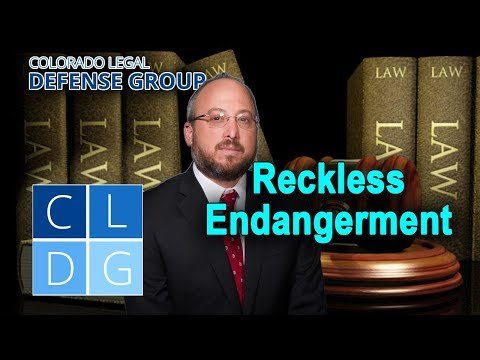Colorado Revised Statute § 18-3-208 defines “reckless endangerment” as “conduct which creates a substantial risk of serious bodily injury to another person.” The offense is a class 2 misdemeanor punishable by up to 120 days in jail and/or up to $750 in fines.
A common defense is that the incident was an accident.
In this article, our Denver Colorado criminal defense attorneys answer the following questions:
- 1. What is reckless endangerment in Colorado?
- 2. What are the penalties under CRS 18-3-208?
- 3. How can a defense attorney help?
- 4. Is it deportable?
- 5. Can the criminal record be sealed?

Reckless endangerment is acting in a highly careless way, and it creates a risk that could harm other people.
1. What is reckless endangerment in Colorado?
Reckless endangerment is when a person recklessly engages in conduct that creates a substantial risk of serious bodily injury to another.1
An example is discarding a lit cigarette on a pile of dry grass in front of an occupied house. Dropping the cigarette on dry grass is reckless since there is a significant risk it would start a fire. And it is endangerment because the fire could seriously hurt the occupants inside the house.
1.1. Recklessness
Reckless conduct is a gross deviation from the standard of care that a reasonable person would exercise. People are reckless when they consciously disregard a significant risk they created.
For purposes of determining whether a defendant’s conduct was reckless, the jury may take into account both:
- The defendant’s personal knowledge and experience (which is a subjective standard), and
- What a reasonable person would have understood under the circumstances (which is an objective standard).2
1.2. Serious bodily injury
Serious bodily injury means physical harm that involves substantial risk of death or either:
- serious permanent disfigurement,
- protracted loss or impairment of the function of any body part or organ,
- fractures, and/or
- second- or third-degree burns3
2. What are the penalties under CRS 18-3-208?
As a class 2 misdemeanor, reckless endangerment carries the following punishment:
- Up to 120 days in jail, and/or
- Up to $750 in fines4
However, the maximum prison sentence increases to one (1) year in jail if both:
- The victim was a mental health professional, and
- The victim was on duty at the Department of Human Services5

Accident is a defense to CRS 18-3-208 charges.
3. How can a defense attorney help?
Defenses against reckless endangerment charges depend on the specific facts of the case. Five common defenses often include (but are not limited to):
- The defendant’s conduct was accidental, so the defendant’s actions did not rise to the level of recklessness;
- There was no risk of serious bodily injury from the defendant’s conduct;
- The defendant was not aware that his/her behavior was creating a substantial risk, and a reasonable person in the same position would not have been aware of the risk;
- The defendant was falsely accused; and/or
- The police officers committed misconduct, such as entrapment, an illegal search and seizure, or coercion of a confession.
Self-defense is not a valid defense to charges of reckless endangerment. Self-defense requires a person to act justifiably, while recklessness requires a person to act with conscious disregard of an unjustifiable risk. They are inconsistent states of mind.6
4. Is it deportable?
The law is unclear whether a reckless endangerment conviction qualifies as a deportable offense. Any non-citizen facing criminal charges should retain an attorney immediately. The attorney may be able to persuade the district attorney to dismiss or reduce the charge to a non-deportable offense. Learn more about the criminal defense of immigrants.
5. Can the criminal record be sealed?
Yes. Reckless endangerment convictions may be sealed two (2) years after the case ends. But there is no wait to petition for a seal if the charge gets dismissed.7 Learn about how to get a criminal record seal in Colorado.

Call our law firm for legal advice on your criminal case. Our criminal defense lawyers offer free consultations.
Our reckless endangerment lawyers will discuss how we may achieve the best possible outcome in your criminal law case. We assist clients throughout the state, including Denver, Douglas County, Colorado Springs, Arapahoe, Boulder, and more.
Our practice areas include every C.R.S. criminal offense, including domestic violence, DUI, DWAI child abuse, vehicular homicide, motor vehicle theft, criminal mischief, sex crimes, resisting arrest by a peace officer, extortion first degree-, second degree-, and third-degree assault, and more. Contact us over the phone, our contact form, or we can meet at our Denver law office:
Colorado Legal Defense Group
4047 Tejon Street
Denver CO 80211
Also see our related articles on reckless driving (CRS 42-4-1401), shooting from a public road (CRS 33-6-126) and Colorado fireworks laws (CRS 12-28-110).
In California? See our article Is reckless endangerment a crime in California?
In Nevada? See our article on reckless endangerment (NRS 202.595).
Disclaimer: Past results are not a guarantee of future results.
Legal References
- C.R.S. 18-3-208.
- People v. Hall (2000) 999 P.2d 207.
- Colorado Revised Statute 18-1-901(3)(p).
- CRS 18-3-208; see also People v. Berner (Colo. App. 1979) 42 Colo. App. 520, 600 P.2d 112; People v. Cauley (Colo. App. 2001) 32 P.3d 602; People v. Hall (Colo. App. 2002) 59 P.3d 298.
- CRS 18-3-208; CRS 18-1.3-501. Prior to March 1, 2022, reckless endangerment was a class 3 misdemeanor carrying up to 6 months in jail and/or $50 to $750 in fines. SB21-271.
- People v. Pickering (2011) 276 P.3d 553.
- CRS criminal code 24-72-703 – 708.

